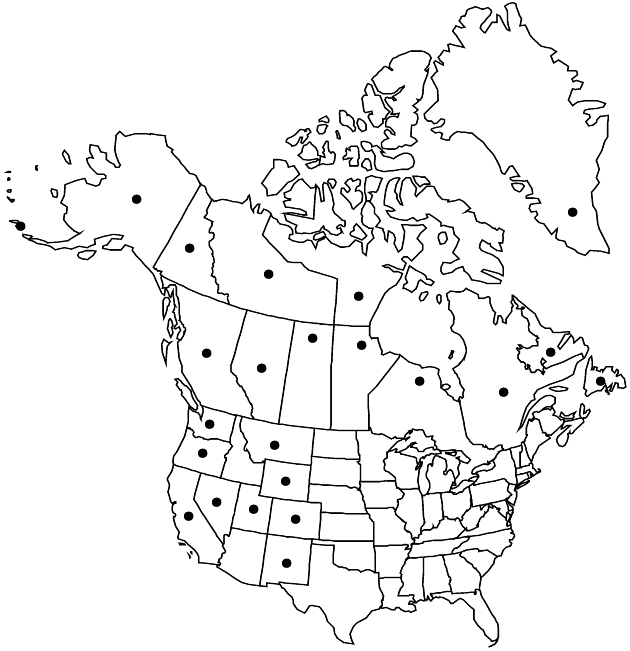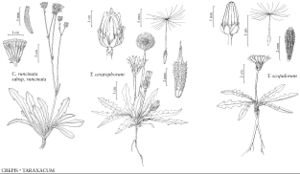Difference between revisions of "Taraxacum ceratophorum"
in A. P. de Candolle and A. L. P. P. de Candolle, Prodr. 7: 146. 1838.
FNA>Volume Importer |
FNA>Volume Importer |
(No difference)
| |
Revision as of 18:36, 24 September 2019
Plants (1–)6–50 cm; taproots branched. Stems 1–10+, ascending to erect, ± purplish (at least proximally), densely villous (young) becoming glabrescent, sparsely villous to glabrate or glabrous proximally, ± densely villous distally. Leaves ± 10, horizontal to patent, sometimes erect; sessile or petioles ± broadly winged (bases barely narrowed compared to blades); blades narrowly oblanceolate to linear-oblanceolate or linear-oblong (often ± runcinate), 4–30 × (0.4–)0.5–5 cm, bases cuneate to attenuate, margins lobed ± deeply to lacerate, irregularly to regularly, often toothed, merely denticulate, or subentire, lobes retrorse, straight or antrorse, deltate to triangular, acute to acuminate, teeth 0–1 on lobes, often more or mostly in sinuses, apices obtuse to sometimes acute, sometimes mucronate, faces glabrous or glabrate to very sparsely villous. Calyculi of 12–16(–20), appressed to spreading, pale, ovate to elliptic or lance-ovate to lanceolate (sometimes thin) bractlets in 2–3 series, 5–12 × (0.9–)1.5–5 mm, margins hyaline, white or purplish, scarious, apices caudate to acuminate, ± strongly horned, callous, or occasionally some (rarely all) hornless, tips obtuse to rounded, scarious, erose. Involucres dark green, sometimes ± glaucous, campanulate to ± hemispheric, (5–)8–19(–21) mm. Phyllaries (10–)12–14(–17) in 2 series, lanceolate to ovate-lanceolate (inner), 1.5–4.5 mm wide, margins scarious or not (outer), inner broadly scarious in proximal 1/2, apices usually horned, occasionally hornless, horns sometimes exceeding apices, tips white to purplish, scarious, erose. Florets 40–85+; corollas yellow, drying cream to whitish (outer abaxially gray or purple-striped on drying), 10–22 × 1–2.8 mm. Cypselae olivaceous to olive brown, tan to olivaceous tan, brown to reddish brown, grayish brown or straw-colored, bodies oblanceoloid to obovoid, 2.5–4(–5) mm wide, cones conic or narrowly conic to broadly terete, 0.5–0.9 mm, beaks slender, 4.5–14 mm, ribs 5, large (bearing 10–15 narrower ones), faces proximally tuberculate or sometimes nearly smooth (usually with at least some tubercules) to muricate in distal 1/3–1/2, sometimes wholly muricate; pappi white to cream, 5–7.5(–8) mm. 2n = 16, [24], 32, 40, 48.
Phenology: Flowering spring–summer.
Habitat: Wet to moist areas, calcareous or igneous rocks, gravel, sand, or clay, wet meadows, shores of streams, sandy or gravelly seashores, seepage slopes, early-melting snowbeds (south)
Elevation: 0–3000 m
Distribution

Greenland, Alta., B.C., Man., Nfld. and Labr., N.W.T., Nunavut, Ont., Que., Sask., Yukon, Alaska, Calif., Colo., Mont., Nev., N.Mex., Oreg., Utah, Wash., Wyo., Eurasia.
Discussion
Taraxacum ceratophorum is the most widespread native dandelion in North America, ranging from the low Arctic and boreal zone to the western Cordilleras, in the montane and alpine zones.
This complex has been subdivided into many microspecies in North America, most of which appear unworthy of recognition. In the Quebec-Labrador Peninsula, Taraxacum ceratophorum grades continuously into what has been called T. hyperboreum. Inclusion of T. hyperboreum bridges the gap between typical T. ceratophorum and T. lacerum. Taraxacum lacerum stands out by its very lacerate leaves, but intermediates exist and it is impossible to draw a firm boundary. The lacerate Newfoundland form, T. longii, may be a spontaneous mutation within the range of T. ceratophorum. If T. lacerum were recognized, we would have to place T. longii within the former based on leaf morphology, though leaf orientation would be odd there (T. lacerum tends to have ascending leaves, and T. longii leaves that are flatter on the substrate). A more thorough morphometric and biosystematic study of this complex is warranted. Nonetheless, I have recognized two segregates (T. laurentianum, T. trigonolobum) that stand out from the continuum otherwise observed in the complex.
Selected References
None.
